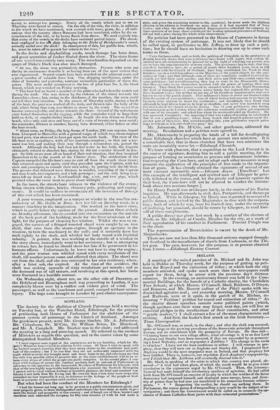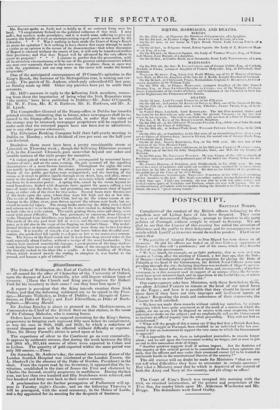IRELAND.
A meeting of the united parishes of St. Michael and St. John was held in Dublin on Thursday week, for the purpose of getting up peti- tions for Repeal and the extinction of tithes ; at which both the city members attended, and spoke much more than the newspapers could report for them, being in arrear with tine previous day's thirteen columns. In the evening, an anniversarydinner was held in the Com- mercial Buildings, for the benefit of a Catholic charity, the Clondalkin Free School; at which Messrs. O'Connell, Sheil, Ruthven, O'Dwyer, and Ronayne, and Mr. Barrett (editor of the Pilot) spoke with un- diminished agitative zeal ; and yesterday morning, Messrs. O'Connell and Ruthven, were at it again, in the parish of St. Michan, re- iterating " Petition ! petition for repeal and extinction of tithes !" As the charity dinner speeches contain some political points (which, though speakers over their wine may forget next day, yet will live as convivial pledges in the recollections of their constituents, and other " gentle readers,") I shall extract a few of the most characteristic and striking. And first, the leader's first attack on the Irish Secretary.— Times Correspondent.
Mr. O'Connell was, as usual, in the chair ; and after the cloth was removed, spoke at large on the growing prevalence of the democratic principle throughout Europe, and its coincidence with the prosperity of Europe. He then said- " Coming home to our own village affairs, what advantage is it to us that Lord Anglesea and Stanley have been removed, if they are succeeded by as prosecut- ing a Lord Wellesley, and as unpopular a Littleton 9 The change in the cards is valueless! I have not the least confidence in either. I will venture to pro- phesy, that they will turn out as Anglesea and Stanley did. I prophesied that Anglesea would he the most unpopular man in Ireland, and that prophecy has been fulfilled. There is, however, one step below Lord Anglesea's unpopularity, and I think that Mr. Littleton will eventually descend into it." Mr. Sheil, in speaking of the crisis in which this country was placed, ob- served—" A trial had taken place, of which the result would be to give wider circulation to the arguments urged by Mr. O'Connell. Thus, the Attorney- General had made himself the involuntary auxiliary of agitation. He had called forth from Mr. O'Connell an exercise of faculty in which the wielderof the fierce democracy hail surpassed himself, and displayed more energy, force, and diver- sity of power than he had ever yet manifested in his numerous forensic achieve- ments. * Respecting the verdict, he should say nothing there.. In Parliament, the course pursued of empanelling a jury would be the subject of in- vestigation ; and there the Government would be called on to reconcile the ex- clusion of Roman Catholics from juries with their reiterated protestations." Mr. Barrett spoke as freely and as boldly as if no sentence hung over his head. "I congratulate Ireland on the political influence of this trial. I may suffer, but martyrs make proselytes; and it is worth some suffering to give my country the benefit of such an uncompromising repeal speech as was made by the
Liberator. * * Was it nothing to have made the Court of King's Bench an arena for agitation ? Is it nothing to have shown that every attempt to make a victim to an opinion is the means of its dissemination—that when discussion of Repeal is silenced without the courts of law, it will only be transferred within their precincts; and that thus Repeal will be advanced by the very efforts to
arrest its progress? * * 1 venture to predict that the prosecution, with all its attendant circumstances, will be one of the greatest embarrassments which any men ever wantonly threw in their own way. It places them in open war with the population; and one step more in the career will render the breach irreparable." One of the anticipated consequences of O'Connell's agitation in the King's Bench, the increase of his Metropolitan rent, is turning out cor- rectly. The parish of St. Audeon, which only subscribed 671. last year, on Sunday made up 106/. Other city parishes have yet to settle their accounts.
Mr. Hill's answers in reply to the gollowing Irish members, remov- ing from them the imputation of being what the Irish Repealers term "the traitor," have been published in Dublin—Mr. John O'Connell, Mr. W. F. Finn, Mr. E. S. Ruthven, Mr. E. Ruthven, and Mr. A. H. Lynch.
The Comptroller-General of the Stamp-office, in Dublin has issued a printed circular, intimating that in future, when newspapers shall be re- turned to the Stamp-office to be cancelled, in order that the value of the stamps may be returned, newspaper proprietors will be required to make oath that the returned papers have not been lent to advertisers, nor to any other person whatsoever.
The Hibernian Banking Company held their half-yearly meeting in Dublin on Monday; when a dividend of two per cent. on the half-year was declared.
Doubtless there must have been a pretty considerable storm at Limerick on Thursday week ; though the following Hibernian account of it, in the Limerick Chronicle, goes somewhat beyond our sober and humble notions of the style proper for narrative.
"A violent gale of wind set in at W.N.W., accompanied by occasional heavy showers of rain • and on the same eveuiug, the gale assumed all the appalling characteristics of a most furious hurricane. Throughout the night, the scene was terrific in the extreme, and the streets presented a most desolate aspect. Nearly all the public gas-lights were extinguished; and the howling of the • storm, as it swept in pitiless squalls through every street, lane, and alley, struck terror to the hearts of every inmate of those mansions which suffered more or less from its destructive power. A spring-tide, raised by the storm beyond its usual boundaries, dashed with desperate force against the quays, rolling a vast mass of water over the docks, te.c. and presenting one continuous sheet of liquid foam, at either side of the river for two miles. Several boats were thrown out of the ducks upon the quay, where they were left high and dry at low tide. The vessels of the Shannon Yacht Club, laid up for the winter season at an- chorage in the Abbey river, were driven against the salmon-weir bank, but re- ceived no material injury. The strong banks enclosing the Abbey river (island and salmon-weir) were broken up, and the waters rushed in, deluging the fields on both sides to a wide extent. The cattle grazing there, cows and sheep, were saved with great difficulty. The long- pavement, or causeway, from Qumpool to the Thomand Gate Distillery, was inundated, and the fields around flooded. The yards of the city gaol were full of watsr, and the tide came up to its very gates, as it did also to the verge of the flagging on Arthur's Quay. The under- ground kitchens in houses adjacent to the river were from one to two feet deep in water. It is worthy of remark, that a few hours befine this dreadful coin - !notion, the quicksilver fell rapidly to a degree so low as we scarce ever remem- ber. The horses of the Ennis coach had to wade knee-deep several miles of the road, especially about Cratloe, without a vestige of the usual landmarks. The salmon. weir received considerable damage, a great portion of the large timber- work having been torn up and sent adrift. Some of the strongest houses in the city literally rocked in the blast like a cradle. A house building off William Street, which wanted merely the roofing to complete it, was hurled to the ground, and became a pile of rubbish."

















 Previous page
Previous page